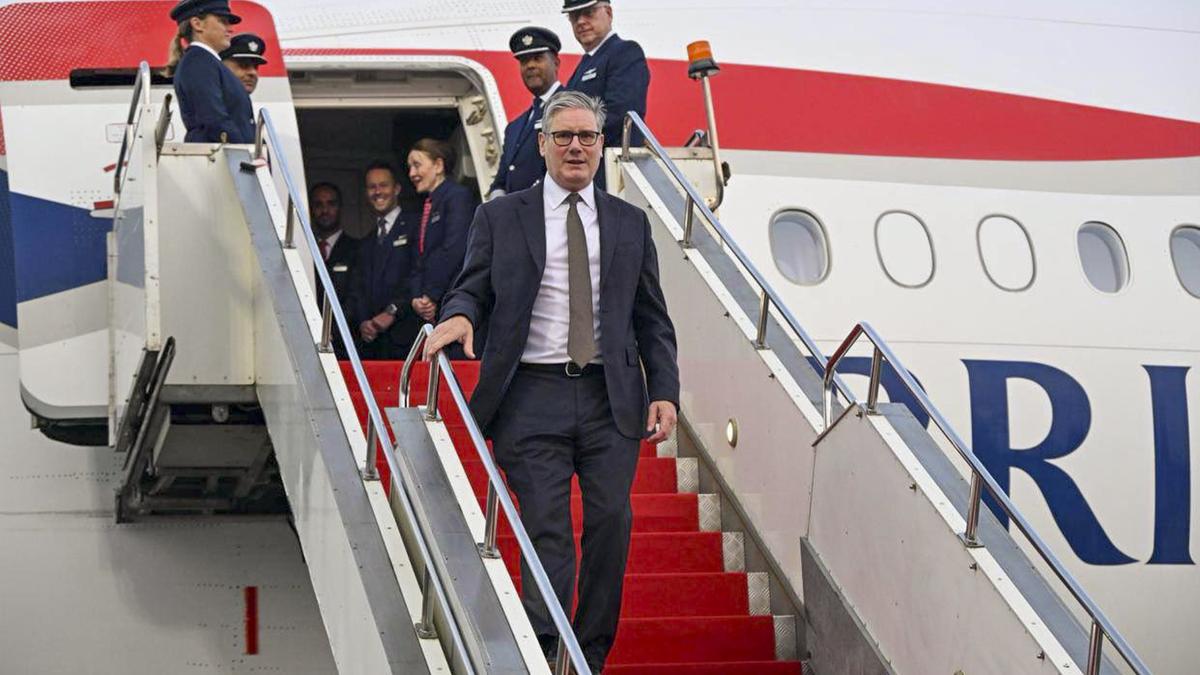
Opportunities waiting to be seized under India-U.K. FTA unparalleled: Keir Starmer
How did your country report this? Share your view in the comments.
Diverging Reports Breakdown
Opportunities waiting to be seized under India-U.K. FTA unparalleled: Keir Starmer
Keir Starmer and Prime Minister Narendra Modi will hold wide-ranging talks on Thursday (October 9, 2025) to explore ways to further expand the bilateral ties. The British leader, accompanied by a delegation of 125 of the U.K.’s most prominent business leaders, entrepreneurs, university Vice-Chancellors, landed in Mumbai this morning on a two-day visit. Mr. Starmer said the trade deal is a “launchpad” to expand bilateral trade and economic growth with India which is set to be the third biggest global economy by 2028. The two countries inked the landmark free trade pact that will increase market access, cut tariffs and double bilateral trade by 2030. The landmark trade deal was firmed up during PM Modi’s visit to London in July.
Mr. Starmer said the trade deal is a “launchpad” to expand bilateral trade and economic growth with India which is set to be the third biggest global economy by 2028.
The British leader, accompanied by a delegation of 125 of the U.K.’s most prominent business leaders, entrepreneurs, university Vice-Chancellors, landed in Mumbai this morning on a two-day visit.
Mr. Starmer and Prime Minister Narendra Modi will hold wide-ranging talks on Thursday (October 9, 2025) to explore ways to further expand the bilateral ties.
“We signed a major trade deal with India in July — the best secured by any country — but the story doesn’t stop there,” the British Prime Minister said.
“It’s not just a piece of paper, it’s a launchpad for growth. With India set to be the third biggest economy in the world by 2028, and trade with them about to become quicker and cheaper, the opportunities waiting to be seized are unparalleled,” he said. Mr. Starmer said growth in India means more choice, stability and jobs at home for the British people.
Duty-free access to U.K. under FTA to drive foreign investment into India
The British Prime Minister’s visit to India came two-and-half months after the two countries inked the landmark free trade pact that will increase market access, cut tariffs and double bilateral trade by 2030. The landmark trade deal was firmed up during PM Modi’s visit to London in July.
A British readout on Mr. Starmer’s India trip said it seeks to build on the momentum from the U.K.-India trade deal as it will open up access for British businesses to one of the fastest-growing economies in the world.
“Following the signature of the landmark U.K.-India trade deal in July, which will lower tariffs on British goods being imported into India, the “door is now open” for British businesses to “turbocharge” their trade with one of the fastest growing economies in the world,” it said.
Top executives of major companies such as Rolls Royce, British Telecom, Diageo, London Stock Exchange and British Airways are part of Mr. Starmer’s delegation.
“We’ve shown there is no limit on our ambition to grow trade with India — in less than a year we’ve gone from restarting talks on a deal, to bringing 125 brilliant business leaders to its commercial capital,” Peter Kyle, the U.K.’s Business and Trade Secretary, said.
“Our deal is the best any country has ever secured with India and places British businesses at the front of the queue to access a huge and ever-growing market. Now, we are hitting the ground running and using every means necessary to ready businesses to take full advantage of the massive wins we’ve secured once the deal comes into force so we can deliver growth, jobs, and prosperity at home,” he added.
India’s average tariff on British products will drop from 15% to three per cent which means British companies selling products to India, from soft drinks and cosmetics to cars and medical devices, will find it easier to sell to the Indian market, according to the readout.
It said whisky producers will particularly benefit from tariffs being reduced immediately from 150% to 75% and then dropped even further to 40% more than the next 10 years that will give the U.K. an advantage over international competitors.
